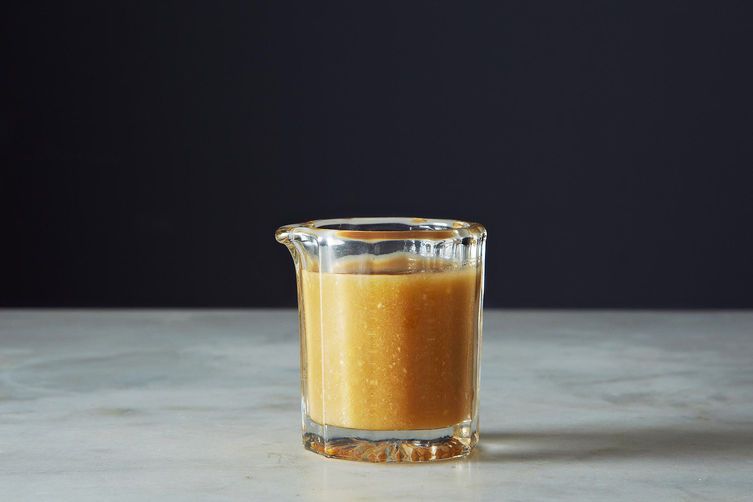Popular on Food52
35 Comments
celezum
August 6, 2019
Shame on you. MSG is a well studied neurotoxin and a chemically derived food additive, not a real food. The fact that you are publishing recipes containing MSG that are sponsored by companies that sell MSG shows your financial bias. You were once a place that respected food, good ingredients and real cooking. Those days are clearly over.
tiya
April 22, 2014
Msg is found in nearly ALL flavoured snacks sometimes hidden as 662. I am one of the few who really does have a very strong sensitivity..even a tiny pinch and I have no issues with moderate amounts of cheese or other glutamate products. Go figure.
Renee S.
April 22, 2014
I am one of those few that are very sensitive to msg. Even in the event of being exposed in smallest amounts I become ill immediately.
Beckworth
April 20, 2014
Many people don't realize that KFC always, and still does use MSG. http://www.kfc.com/nutrition/pdf/kfc_ingredients.pdf. KFC , though not the healthiest choice even without msg, has never me a headache or any of the symptoms attributed to MSG. Granted, of course there are those who are sensitive to MSG. Others could be due to the power of suggestion which is very powerful. There are people who are fatally allergic to peanuts, seafood, strawberries, but that does not means we should eliminate those items from the food supply.
Herschelian
April 20, 2014
Hooray! at last someone is spelling out the truth about this food myth. I am living in China and did much research into MSG and its uses etc for a post in my blog Jasmine Tea & Jiaozi http://herschelian.wordpress.com/2012/02/28 I've had many emails as a result. But don't be surprised if people don't want to believe what you say - they love to think of MSG as some nasty Frankenfood additive.
I_Fortuna
April 21, 2014
I assure you this is not myth. Not just Chinese restaurants use MSG. We have to ask but most don't. Just because you have not experienced MSG as a problem does not mean others haven't. This sensitivity to MSG did not happen in a vacuum there have been so many complaints about it. Not everyone is sensitive to gluten either but many people are and dangerously so (Celiac disease). Those people with autoimmune diseases such as diabetes, cancer and celiac are very sensitive to additives. It is a nasty additive for hubby but it does not affect me at present.
Herschelian
April 22, 2014
Coeliac disease, Crohns and other digestive diseases are well documented and can be tested for - they are extremely serious conditions. The thing about MSG is that there is NO scientific evidence for the widespread belief in there being some kind of 'syndrome' and exhaustive studies have been conducted in research establishments all over the world.
This is NOT because I personally do not experience MSG as a problem as in the past I believed it was a problem - it is because, having done a lot of reading, I think this is a self-reinforcing myth. Read some of the vast amount of research available, and try to keep an open mind. Obviously there are chemical additives that can potentially cause problems but frankly, MSG is not one of them.
This is NOT because I personally do not experience MSG as a problem as in the past I believed it was a problem - it is because, having done a lot of reading, I think this is a self-reinforcing myth. Read some of the vast amount of research available, and try to keep an open mind. Obviously there are chemical additives that can potentially cause problems but frankly, MSG is not one of them.
meg K.
April 20, 2014
if a recipe calls for msg and you would prefer to not use it. what can you substitute??
I_Fortuna
April 21, 2014
What recipe are you referring to? I check out recipes every day and I have never seen a call for it except for once. Why use a substitute? Just leave it out or see how it affects you. You may not have a reaction to it. Not everyone does. Personally, I am concerned about longterm effects.
Julie M.
April 21, 2014
Hi Meg, it is pretty rare to come across a recipe that calls for MSG. You can develop the same umami taste by using natural foods containing glutamate, like Parmesan, mushrooms, tomatoes, broths, fish sauce, and soy sauce, for example. Experienced chefs do indeed experiment with MSG, how it can be derived, and its impact on overall flavor impressions, but as an additive it is not often used in the home kitchen (or even in these chef's restaurants because of the obvious negative public opinion surrounding it). Here is an interesting article on the subject: http://www.buzzfeed.com/johnmahoney/the-notorious-msgs-unlikely-formula-for-success
I_Fortuna
April 20, 2014
Julie, it looks like there are a lot more people affected by MSG than you figured and these are just readers of this blog. I think your article treats MSG too lightly.
Julie M.
April 21, 2014
Hi there -- I'm sorry you feel that the article treats the subject too lightly. As I point out, there is indeed a population that has adverse reactions to glutamate (in both naturally occurring and derivative forms), however the aim of the article is the demystify what exactly MSG is, where it is derived from, and why it is used -- and to explain that most people do not suffer from the so-called "Chinese Restaurant Syndrome" that is so often referenced in our culture. Of course, it is a personal choice whether to consume products that contain MSG, and like a lot of other foods we eat or drink, when it is consumed in too-large quantities (including in its natural form), it can cause physical discomfort and harm, even to those of us without the allergy.
Hiya
April 20, 2014
I agree with above. There's a difference between naturally-occuring glutamate and synthesized MSG. I have read studies where MSG disrupts neurotransmitter production and regulation in your brain, and naturally-occuring glutamate does not . I would read studies before coming to a conclusion that MSG is safe even for people who do not notice its effects.
alia
April 20, 2014
on cheese headaches - for those with chronic headaches - one of the prescribed solutions by physicians is to eliminate cheese (in fact any fermented or aged food product) from the diet. so yes, there is a "cheese headache"
Teddee G.
April 20, 2014
This article is so misleading and I hope a lot of people don't get ill as a result. If you have ever experienced the swollen faces and crushing headaches my sister and I experience after getting a snootful of MSG, you wouldn't have even written this article. And, yes, we do get cheese headaches as well!
I_Fortuna
April 20, 2014
Free gluamate is much different than MSG. Hubby gets violent diarrhea eating anything with MSG, sodium nitrates or nitrites and some of the other preservatives and flavor enhancers. We now buy uncured Oscar Meyer bacon. It has celery juice instead. There are natural nitrites in it and no bad reaction.
Teubner F.
April 16, 2014
Thanks Julie for bringing up a topic that is very dear to me!
I fully agree with everything you wrote.
To support your piece I would like to share my personal experiences: I have worked for several years as a F&B / Hotel manager in Asia (China and Vietnam) and I can tell you that Ajinomoto (translated: The Essence of Taste) and the likes are everywhere! And NO, my guests and coworkers did not have a headache after their meal. Significantly enough MSG was discovered by a man named Kikunae Ikeda in Japan. He found it as the "salt" that makes fermented seaweed broth so tasty. And he was the one who first made the connection to the umami taste. Furthermore, as you say, glutamate is found naturally in much of the staples of Asian cuisine -- soy sauce, broths, Vietnamese fish sauce, and other fermented items.
I fully agree with everything you wrote.
To support your piece I would like to share my personal experiences: I have worked for several years as a F&B / Hotel manager in Asia (China and Vietnam) and I can tell you that Ajinomoto (translated: The Essence of Taste) and the likes are everywhere! And NO, my guests and coworkers did not have a headache after their meal. Significantly enough MSG was discovered by a man named Kikunae Ikeda in Japan. He found it as the "salt" that makes fermented seaweed broth so tasty. And he was the one who first made the connection to the umami taste. Furthermore, as you say, glutamate is found naturally in much of the staples of Asian cuisine -- soy sauce, broths, Vietnamese fish sauce, and other fermented items.
Sammy'sMom
April 15, 2014
I have a violent reaction when I eat anything with msg. Usually within 10 to 15 minutes I have severe nausea and it goes down hill from there.
Helens
April 20, 2014
Man that sucks for you. MSG's in so many things.
How do you respond to high-glutimate foods like parmesan? Same problem or not so bad?
How do you respond to high-glutimate foods like parmesan? Same problem or not so bad?
paczryk
April 15, 2014
"Why doesn’t everybody in China have a headache?"
Remark from a Chinese person: Chinese restaurants' cooking are not representative of the cooking of most Chinese people in my experience (China being an incredibly diverse nation, I dare not overgeneralize), who generally don't have MSG in their kitchens~
Remark from a Chinese person: Chinese restaurants' cooking are not representative of the cooking of most Chinese people in my experience (China being an incredibly diverse nation, I dare not overgeneralize), who generally don't have MSG in their kitchens~
I_Fortuna
April 20, 2014
Yes, I believe this is quite true except for those pepople who eat a lot of processed foods and I would think the younger generations are those people generally.
Mark F.
April 15, 2014
What you failed to mention is that Glutamate is toxic to the nervous system ... ask the ALS Association ... not quite as benign as your aticle makes it out to be.So much for clearing the air .
Julie M.
April 15, 2014
Hi there, Mark. Thanks for your comment -- it's a very interesting topic to discuss. Normal levels of glutamate are important for the function of the nervous system, but you're right that it's always important to give pause about what we put in our bodies. From my research on the association's site, it seems that ALS interferes with the proper reaction of natural glutamate and calcium within the nervous system (http://www.alsa.org/research/about-als-research/glutamate.html).
Vitor H.
April 16, 2014
More or less. Glutamate could be toxic, due a excessive stimulation by the neurotransmitters (and many others can trigger the effect too).
In other hand, glutamate is a essential excitatory neurotransmitter. If you eat or not MSG, we have glutamate in ourselves already.
In other hand, glutamate is a essential excitatory neurotransmitter. If you eat or not MSG, we have glutamate in ourselves already.
AngieandBrian H.
April 15, 2014
The problem is there is naturally derived MSG and there is chemically synthesized MSG. And chemically synthesized MSG is being used not to compliment or enhance a flavor, but often to create flavor where none exists in a highly processed food and therefore it is being used to get us to eat and even become addicted to food that is bad for us and we probably wouldn't touch if it did not have the MSG flavoring in it and it is being consumed in high amounts if people are buying and eating processed foods.
Julie M.
April 15, 2014
Great point -- it's important to be a critical consumer and to be aware of those differences.
Aaron
April 16, 2014
We need to stick to healthy foods with natural MSG. Now where can I get a rasher of bacon....
Vitor H.
April 16, 2014
It's a good point, but we can't only blame the food industry, can we? Nobody forced us to eat… we chose. If the product exists, it's because have a buyer.
chickadee
April 20, 2014
Thank you Angie and Brian Hull! When MSG is derived from a source and then added to a food and eaten, it is not the same as eating a whole food which has naturally occurring msg and all the other nutrients and components which may balance any ill effects out.
I_Fortuna
April 20, 2014
Ocsar Meyer makes uncured bacon now without Sodium nitrates and nitrites. Instead, celery juice is used with natural nitrites. Hubby can now have bacon again.





See what other Food52 readers are saying.